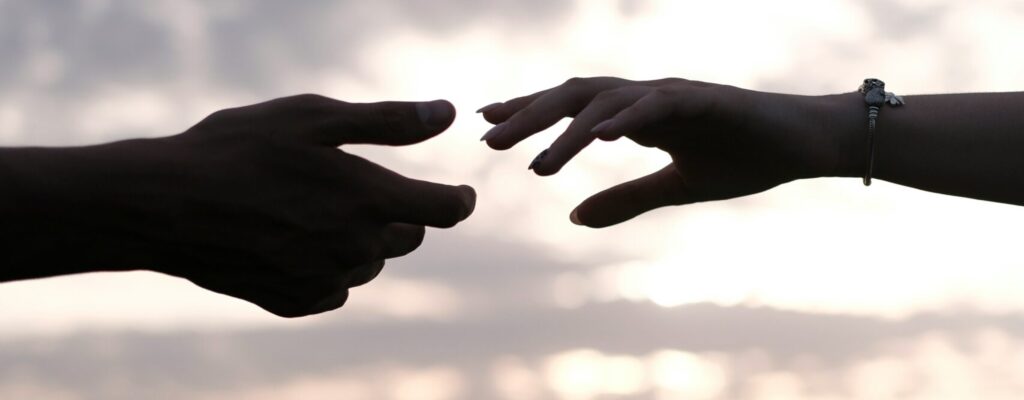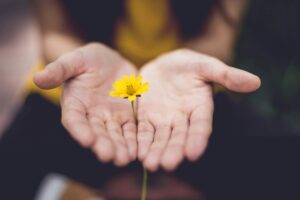Coping | Daily Life | Disability


Photo by Denis Altindas on Unsplash.
About a year ago, I wrote a blog about my experience with PTSD brought on by traumatic medical events, courtesy of my Crohn’s disease. I wrote that blog to raise awareness about medical trauma, and to give voice to the debilitating psychological aspects of IBD and other chronic illnesses. I closed the blog with a hope that the future held a version of me who had healed enough to write about how to recover from and cope with ongoing medical trauma as a chronically ill person.
I have held off on writing this blog for a while now because I do not feel that I am “healed enough” to offer any wisdom to our community. In truth, I am not sure if I will ever feel “healed enough,” whatever that means. Trauma still plays a regular role in my life. But, for the last year, something else has played a regular role in my life: community acupuncture.
What is community acupuncture, you may ask?
Community acupuncture, as I have come to know through Working Class Acupuncture (WCA) in Portland, Oregon, offers acupuncture in a community setting to anyone who needs it at an affordable, sliding-scale price. At the WCA clinic near my apartment, this looks like patients getting acupuncture in a large room filled with recliners. The acupuncturist spends a few minutes treating each patient, focusing on points on the arms, legs, hands, feet, and head, before moving on to the next patient. The clinic has a sliding scale of $20-$40 per treatment and works with patients to adjust the scale to what works for them so that they can come in with a greater frequency if needed.
I first heard about community acupuncture through my nurse case manager, after an insurance denial cut off my access to acupuncture that was helping with my very severe chronic migraine. Initially, I thought of community acupuncture as “less than” what I had been getting at the “regular” acupuncture clinic my insurance had covered. After a few weeks of getting treatments at WCA, though, I quickly realized that community acupuncture could offer me not only relief from physical pain associated with migraine, but also something I had never expected: relief from my medical PTSD and the agonizing distress it causes.
***

Photo by Farrinni on Unsplash.
In the beginning, I never consciously decided to go to acupuncture more than once a week, despite the acupuncturist’s recommendation that I come in several times a week–at a very reduced cost that I could afford, even with financial constraints caused by chronic illness limiting my ability to work (nowadays a partnership with CareOregon allows me to access the clinic at no cost). But, most nights, I would find myself sitting alone at home, often in severe pain, and often severely depressed, and so I would just shrug and make my way to the clinic. I found myself gravitating toward the clinic, day after day, in that way that any person in intense physical and emotional pain naturally gravitates toward anything that brings relief.
At first, I was quite anxious about going to the clinic. Any new medical setting and discussion of my health with a new provider is a source of extreme distress for me. However, I came to realize that community acupuncture did not trigger my PTSD in the same way other medical appointments did. The acupuncturist took about five minutes to treat me each time, which reduced the amount of time I had to spend recounting traumatic details of my health history. She got to know me pretty well once I started coming in multiple times a week, so it became easy for us to communicate. The communal setting, which I initially thought of as a “cheaper” version of acupuncture, actually turned out to be the most comforting and healing aspect. For one, it meant I did not have to remove my clothes and change into the dreaded medical gown that has been the attire for so many of the most terrifying experiences of my life. And, moreover, the community setting actually gave me access to something hard to come by when you are someone living with Crohn’s, fibromyalgia, chronic migraine, OCD, and PTSD (and more): human connection.
On my worst days, it can be impossible for me to engage in conversation, or what society would consider typical socializing. I have never been much of a social butterfly to begin with, and my illnesses have pushed me further into isolation in many ways. Perhaps napping with fellow community members in recliners while you receive acupuncture is not the most social activity, but, for me, it provides a way to feel connected to other people, even on days when many forms of socialization are not possible for me. I began to realize that just sitting in the room with other people, many of whom are also in pain and also trying to heal, brings me comfort and a sense of community.
Aside from this sense of community, my acupuncture treatments have brought me something I never thought I would feel in my body again: a sense of safety. As I’ve described in my past blog on medical trauma, one of the hardest parts for me is the intense urge to escape my body. My body is the scene of the trauma, home to the illnesses that perpetrate the trauma, and it does not feel safe in here.
Sitting in the acupuncture chair during my first few treatments, I started to feel a little safer in my body. Just for a few minutes, I would feel my body relax. I liked the sensation of the needles being inside me. It felt good. I liked the feeling of the cozy recliner on my back, the warm blankets carefully placed over me so as not to crush the needles, the quiet, soothing music, and the whisper of other patients talking to the acupuncturist about their own pain.
Over time, the small feeling of safety that I would feel for a few minutes during acupuncture appointments grew. I began intentionally planning to go to the acupuncture clinic several days a week. After a while, I was able to summon that feeling of safety inside myself just by thinking about my upcoming acupuncture appointment. The appointment became an anchor that kept me from spiraling on hard days–or that helped pull me out of a spiral on the hardest days. During distraught phone calls with my therapist, he’d ask, “Are you going to acupuncture tonight?” No matter how bad things got, there was always the acupuncture clinic and that small feeling of safety that I could hold on to.
***
 Just as my traumatic medical experiences have compounded each other to deepen the wounds, experiences of safety in my body have also grown slowly but surely, with each moment of safety building off of the next. Someday, I hope, maybe my sense of safety will be as big as (or maybe even bigger than) my trauma wounds.
Just as my traumatic medical experiences have compounded each other to deepen the wounds, experiences of safety in my body have also grown slowly but surely, with each moment of safety building off of the next. Someday, I hope, maybe my sense of safety will be as big as (or maybe even bigger than) my trauma wounds.
I’m not sure if I will ever fully “recover” from medical PTSD. The unique thing about medical trauma in chronic illness is that, for many of us, the trauma has no clear endpoint. We may go through periods of time where we are doing better, but, sometimes, even if you do everything “right”, your IBD flares. Your medication stops working. Your labs look funny and you need another colonoscopy, or something goes wrong and you end up in the Emergency Department. As IBD patients, we know that the traumatic events that have happened in the past because of our IBD may very well happen again in the future.
So, for me, healing from trauma is not so much about fully moving on and living a life without the trauma. It is about learning how to live alongside the trauma, both the past trauma and the trauma that will likely happen again in the future. It is about building myself up so that the next medical trauma doesn’t knock me down quite as hard. About learning how to cultivate, not just a sense of safety, but a sense of safety that is sturdy enough to withstand the new traumas.
***
When I tell people that I routinely go to acupuncture, they often ask me, excitedly, “Does it help?!” They want to know if it has reduced the severity of chronic migraine, if it has made my fibromyalgia go away, if it has cured my Crohn’s, fixed my digestive issues, and restored my appetite. To which I always say, “Yes, it helps decrease my pain and give me more energy.”
The physical pain relief I get from acupuncture brings me tremendous gratitude and makes my life so much more bearable. But, even more than relief from physical pain, acupuncture has dramatically improved my overall experience of life. The sense of safety community acupuncture has planted in me is such that my body feels like a place that I can inhabit again, even if the pain doesn’t go away, and even on days when my PTSD makes me want to run from my flesh and blood. Community acupuncture has helped me feel connected to my local world and has allowed me to (slowly) repair my relationship with a body that, for a long time, has felt like the cruelest enemy I could ever face. Community acupuncture has taught me how to find moments of peace in a life that I thought could have none.

Photo by Lina Trochez on Unsplash.
While community acupuncture is a growing phenomenon, I know not every Girl With Guts will be able to access it or will find it to be as helpful as I have. The point of this blog is not to tout community acupuncture as the one and only solution to medical trauma, but more to inspire hope that solutions do exist. Unexpected, unconventional solutions that maybe you stumble on one day by mistake. Maybe you are at your wits end and you are just about ready to give up when something new falls into your life and you just shrug and say, “What have I got to lose?” And one day, after letting this unexpected thing become part of your life, you wake up and realize: I’m healing.
**To search for a community acupuncture clinic near you, visit the People’s Organization of Community Acupuncture Clinic Finder
